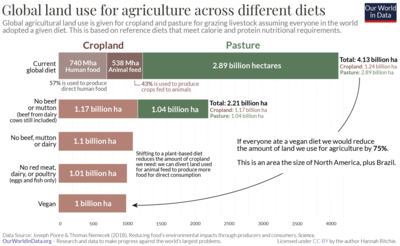The examples and perspective in this article may not represent a worldwide view of the subject. (May 2022) |

A flexitarian diet, also called a semi-vegetarian diet,[1] is one that is centered on plant foods with limited or occasional inclusion of meat.[2][3][4][5] For example, a flexitarian might eat meat only some days each week. Flexitarian is a portmanteau of the words flexible and vegetarian, signifying its followers' less strict diet pattern when compared to vegetarian pattern diets.[1]
- ^ a b Derbyshire, Emma J. (6 January 2017). "Flexitarian Diets and Health: A Review of the Evidence-Based Literature". Frontiers in Nutrition. 3: 55. doi:10.3389/fnut.2016.00055. PMC 5216044. PMID 28111625.
- ^ Langley-Evans, Simon (2009). Nutrition: A Lifespan Approach. Wiley. p. 172. ISBN 978-1-4443-1640-7.
There are many forms of vegetarian diet from the semi-vegetarian (consumes meat infrequently)...
- ^ "Becoming a Vegetarian". Kidshealth.org. Retrieved 2 May 2015.
- ^ "Semi-Vegetarian - Vegetarianism". Medicine Online.
semi-vegetarian: mostly follows a vegetarian diet but eats meat, poultry and fish occasionally
- ^ Koletzko, Berthold (2008). Pediatric Nutrition in Practice. Karger. p. 130. ISBN 978-3-8055-8477-7.